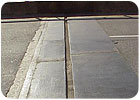CASE STUDY: Road Tested
Dow
Corning’s rapid cure silicone helped Colorado
highway officials cost-effectively protect its bridges in Glenwood Canyon, CO,
while keeping the road closures to a minimum.

 Bridges and elevated sections of highway
have to perform in extreme conditions. Handling changing weather and
high-traffic loads means that fixed and expansion joints must allow for
structure fluctuations, while being sealed to protect structure
integrity.
Bridges and elevated sections of highway
have to perform in extreme conditions. Handling changing weather and
high-traffic loads means that fixed and expansion joints must allow for
structure fluctuations, while being sealed to protect structure
integrity.
Most bridges built after the late 1960s use preformed rubber compression to seal joints, which typically begin to fail after only a few years. This leads to water leaks and accumulation of de-icing salts and debris, which can rust or corrode the substructure components, columns, and piers of a bridge or elevated roadway.
Replacing these seals can be an expensive and laborious process, especially when the new seals can fail again and require another replacement.
The Colorado Department of Transportation (CDOT) was looking for a better solution when it needed to reseal the joints along I-70 in Glenwood Canyon, CO. It wanted an easy and cost-effective installation that would prevent water from entering the joint and not require long road-closure times.
“There was a rubber seal in place when we began the project,” said Joe Kelly, G.A. Western Construction. “We removed the rubber, replaced it with an epoxy and then applied the X.J.S. system to the two-inch expansion joint. So far the project has done an excellent job of solving CDOT’s perennial problem with faulty two-inch joints.”
The X.J.S. system enhances joint performance without complicated installation or extensive road closures. “(It) has provided a relatively simple solution for joint replacement and repair,” said Delmon French, Colorado Department of Transportation. Road closures are a particular concern in remote areas, such as Glenwood Canyon, where alternate routes are not available.
“We worked closely with CDOT’s bridge engineers to find ways to complete needed repairs with minimal impact on the traveling public,” said Dale Baker, SSI Highway Products. “The X.J.S. joint system gave CDOT a flexible solution in terms of joint configuration and traffic accommodation when repairing bridge expansion joints in Glenwood Canyon.”
The X.J.S. system has been in use since the early 1990s throughout the United States in a variety of climates and configurations. “Some of the joints are up to five years old and, as of January 2008, have performed well in the harsh conditions experienced on this stretch of I-70,” CDOT’s French said.
The product has been used successfully by DOTs and transportation authorities throughout the United States.
“We will definitely be working with the product on current and future projects,” Joe Kelly said.
For more information, phone (877) SEALANT (877-732-5268) or visit www.dowcorning.com/construction.

The bridge joints along I-70 in Glenwood Canyon are subject to high traffic loads and extreme temperature changes.

The X.J.S. joint seals gave CDOT a cost-effective, easy installation.
Most bridges built after the late 1960s use preformed rubber compression to seal joints, which typically begin to fail after only a few years. This leads to water leaks and accumulation of de-icing salts and debris, which can rust or corrode the substructure components, columns, and piers of a bridge or elevated roadway.
Replacing these seals can be an expensive and laborious process, especially when the new seals can fail again and require another replacement.
The Colorado Department of Transportation (CDOT) was looking for a better solution when it needed to reseal the joints along I-70 in Glenwood Canyon, CO. It wanted an easy and cost-effective installation that would prevent water from entering the joint and not require long road-closure times.
Dow Corning and SSI Joint System Provides Solution
CDOT turned to Silicone Specialties Inc. (SSI), a nosing material manufacturer and Dow Corning sealant distributor, and Dow Corning to learn about the X.J.S.® Expansion Joint System, which combines the wear-resistance of SSI’s Silspec® 900 Polymer Nosing System (PNS) with the rapid-curing, high-movement capability of Dow Corning® 902 RCS joint sealant.“There was a rubber seal in place when we began the project,” said Joe Kelly, G.A. Western Construction. “We removed the rubber, replaced it with an epoxy and then applied the X.J.S. system to the two-inch expansion joint. So far the project has done an excellent job of solving CDOT’s perennial problem with faulty two-inch joints.”
The X.J.S. system enhances joint performance without complicated installation or extensive road closures. “(It) has provided a relatively simple solution for joint replacement and repair,” said Delmon French, Colorado Department of Transportation. Road closures are a particular concern in remote areas, such as Glenwood Canyon, where alternate routes are not available.
“We worked closely with CDOT’s bridge engineers to find ways to complete needed repairs with minimal impact on the traveling public,” said Dale Baker, SSI Highway Products. “The X.J.S. joint system gave CDOT a flexible solution in terms of joint configuration and traffic accommodation when repairing bridge expansion joints in Glenwood Canyon.”
The X.J.S. system has been in use since the early 1990s throughout the United States in a variety of climates and configurations. “Some of the joints are up to five years old and, as of January 2008, have performed well in the harsh conditions experienced on this stretch of I-70,” CDOT’s French said.
The product has been used successfully by DOTs and transportation authorities throughout the United States.
“We will definitely be working with the product on current and future projects,” Joe Kelly said.
For more information, phone (877) SEALANT (877-732-5268) or visit www.dowcorning.com/construction.
Links
Looking for a reprint of this article?
From high-res PDFs to custom plaques, order your copy today!


